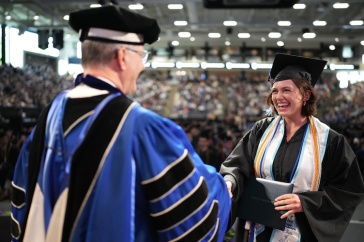
Our world cries out for individuals ready to commit themselves to resolving rising threats to human security. In response, the University of New Hampshire has launched a fully online Master of Science in Global Conflict & Human Security.
The World Bank estimates that by 2030, two-thirds of the globe’s extreme poor will be living in conflict-torn states. The pandemic is exacerbating vulnerabilities to hunger, poverty and violence. Fraying public trust fueled by disinformation, armed extremist groups and increasing resource competition are intensified by splintered global attitudes towards climate change and the public health crisis, all of them feeding into growing threats to human security.
This stark reality has made conflict and human security a top priority for U.S. foreign policy, says Melinda Negrón-Gonzales, associate professor of political science at UNH and UNH Manchester specializing in global studies and human conflict. She says UNH Online’s new master’s program is aligned with the anticipated growth in this sector.
“The Biden administration has made it clear that it will reassert U.S. leadership around the world in part by elevating the work done by the State Department, specifically the U.S. Agency for International Development,” Negrón-Gonzales says. “This translates to both job growth and job security for graduates of the Global Conflict & Human Security program, who will be prepared to address today’s most pressing challenges.”
In 2020, the World Bank launched a new plan to address these global threats, the U.S. Congress dedicated $1.15 billion toward conflict prevention and peacebuilding and the president added the USAID administrator to the National Security Council. Peacebuilding initiatives will be piloted in at least five priority countries, presenting an opportunity to test, study and refine U.S. government partnerships with communities and governments in fragile states to address the drivers of conflict such as human rights abuses, social and economic exclusion, corruption, and impunity.
Negrón-Gonzales says reducing instability in countries that are at risk of violent conflict and extremism entails realigning U.S. diplomatic, development and defense efforts, which would require a skilled workforce.
“It is hoped that the new administration will build on this strategy to advance American commitment to leadership on democracy and human rights,” Negrón-Gonzales says. “These efforts will call for more professionals in humanitarian relief, global development, peacebuilding and more.”
Designed for working professionals and full-time students alike, the fully online Global Conflict & Human Security master's program cultivates a deep understanding of the challenges facing conflict-affected societies. Taught by faculty who are leaders in the field, students learn to assess human security threats and promote social, economic and political development while building durable peace.
The program offers part- and full-time enrollment with January and August start dates, and it can be completed in as little as one year. Learn more about the program online, or contact the UNH Online for more information at unh.online@unh.edu or (855) 250-6699.
-
Written By:
Kassidy Taylor | Marketing & Communications, UNH Manchester | kassidy.taylor@unh.edu

















































